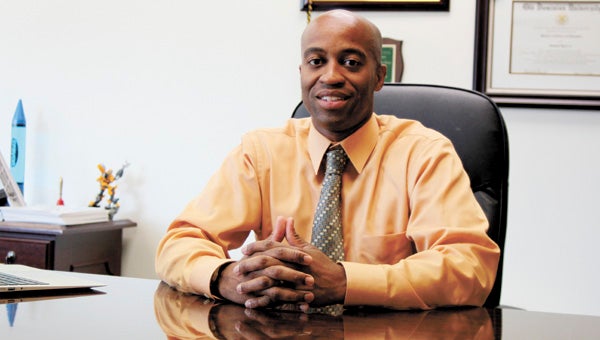Raising the bar at King’s Fork
Published 8:34 pm Tuesday, July 23, 2013

Stenette Byrd III, its new principal, said he wants to engage the community about ways of improving King’s Fork High School.
Regular classes at two of Suffolk’s three public high schools will resume in the fall with new principals at the helm — though none newer to the district than Stenette Byrd III at King’s Fork High.
Byrd, who has decorated his office with college photographs, model motorcycles and an acoustic guitar, is a new recruit to Suffolk Public Schools after holding several principal positions at Isle of Wight Public Schools.
Douglas Wagoner is the new principal at Lakeland High School, where he was an assistant principal previously.
Byrd said has been busy discussing the King’s Fork High changeover with Suzanne Rice, his predecessor whose stint was more recently punctuated by a move toward allowing cellphones and iPads in classrooms.
Otherwise, Byrd said he’s been settling into his new role by “getting the master schedule taken care of.”
Byrd and Wagoner come to their new jobs facing the same challenge: Getting their respective schools, both on provisional status, fully accredited.
Byrd said he is confident and “looks forward to the challenge.”
“There are certainly practices that can be put in place that have been proven to show increased student achievement,” he said.
“I haven’t met the whole staff, but everyone I have met, their heart’s in the right place.”
The desired result will be achieved by following Rice’s lead, he said.
“I can tell from things I have seen (that) Dr. Rice put some good things in place.”
As an accredited-with-warning school, King’s Fork High School is required to submit an improvement plan to the state.
“It’s a good plan,” Byrd said.
Strategies outlined in the plan include a teacher-student mentoring program, a Freshman Academy, graduation coaches, credit-recovery lab and peer mediation group, to list a few.
New to the job, Byrd is still getting acquainted with the plan’s full scope, but said he was excited about implementing it.
The Freshman Academy, targeting rising freshmen, offers “extra support” to help with the transition, he said.
Indicators that can mark an incoming student for special attention, he said, can include age and lack of success in the eighth grade.
“Some students just have a history, and maybe parents might be concerned about the maturity level and want to get extra support,” he said.
With roundtable sessions in the library, Rice had also mined community leaders for solutions to the school’s dropout problem. Byrd said he wants to continue that spirit of community engagement.
“Everybody has different areas of expertise, and you never know what kind of magic is going to come out,” he said. “We are going to force ourselves to make time to have those conversations with our external community.”
Byrd wouldn’t say definitively whether he wants to continue with mobile devices classrooms. School Board members have sought input from the high school principals before setting an official policy.
“It’s really a community decision, regardless of what my personal feeling may be,” Byrd said, though adding he’s coming from a school where every student had iPad access.
“I believe it’s the way of the future that needs to become part of our educational program,” he said.






